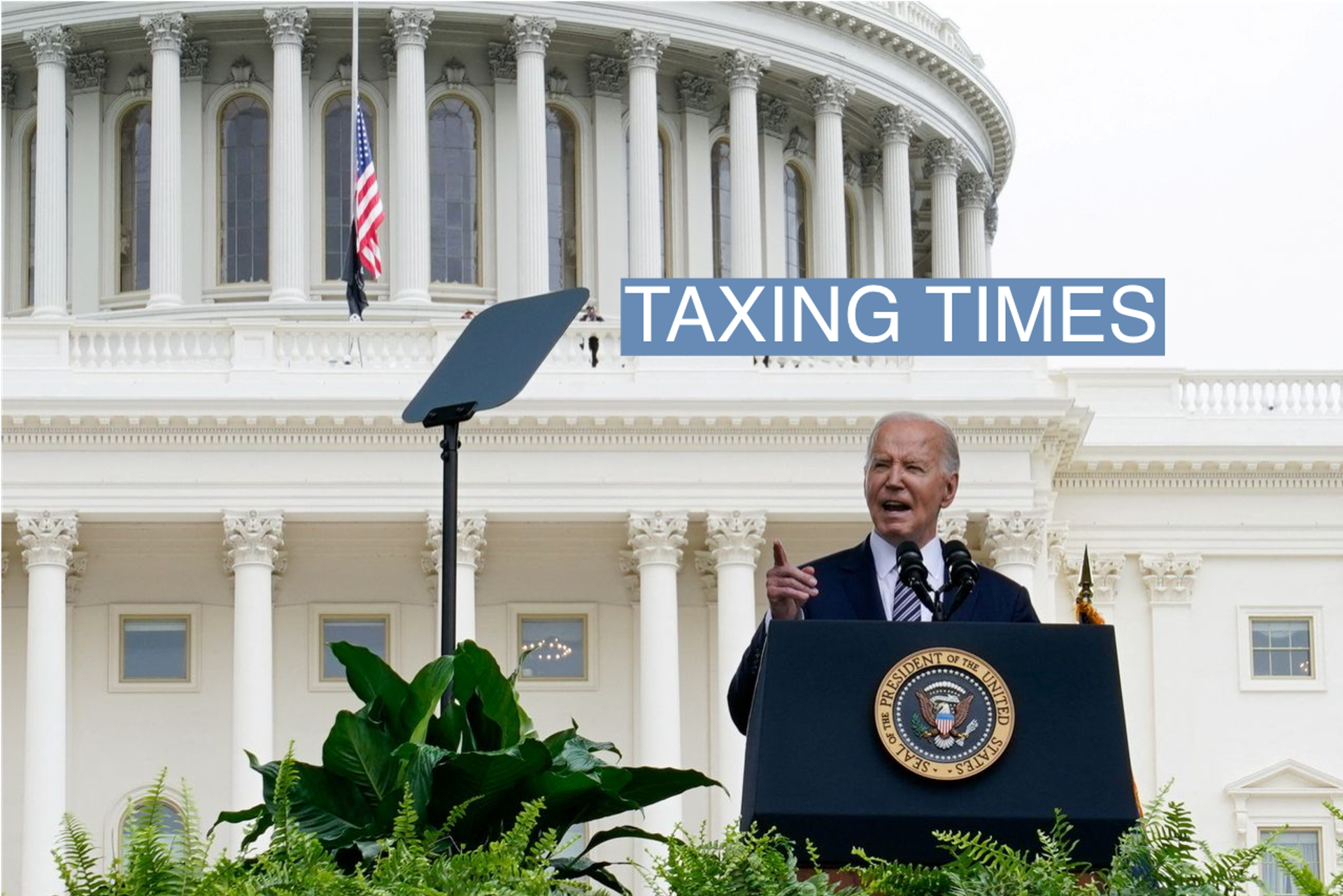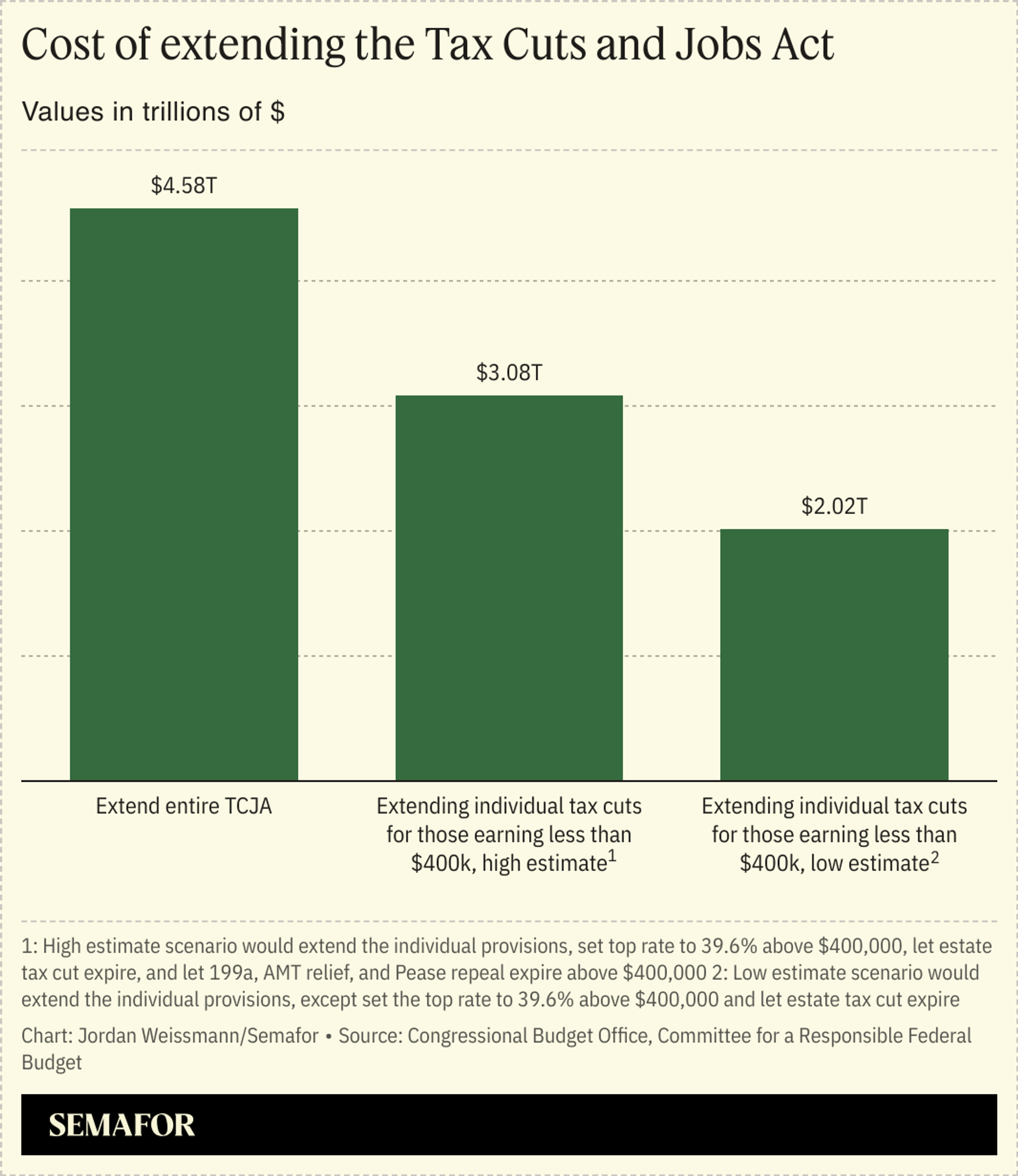The News
Presidencies are unpredictable — no one can be sure what challenges Joe Biden or Donald Trump would face in a second term. But there is one that’s 100% certain: A colossal multi-trillion-dollar fight over taxes that’s likely to be one of the biggest lobbying battles in policy history.
With large chunks of the 2017 Tax Cuts and Jobs Act set to expire at the end of next year, along with a key piece of the 2022 Inflation Reduction Act, whichever party wins the White House and Congress will have the opportunity to rewrite much of the IRS code. If there’s a divided government, the negotiations will be a massive undertaking that could push both parties in unusual directions. That battle will have major consequences for business, climate, the deficit, and much more.
“This is probably the Super Bowl of tax and economic policy,” said U.S. Chamber of Commerce Executive Vice President Neil Bradley.
Though Trump has yet to release an official tax plan, the former president is intent on preserving his biggest legislative achievement, and has signaled he’d seek further cuts. Biden has put forward numerous proposals aimed at raising taxes on multinational corporations and the richest Americans, but vowed to spare households earning under $400,000 from any increases.
Even if Democrats or Republicans win a November sweep, that won’t guarantee them an easy lift in 2025, given how both parties have struggled to shepherd their agendas with narrow majorities. The sheer cost of extending even part of the Trump cuts is sure to complicate the effort.
“The election results are going to matter a lot,” Marc Goldwein, senior vice president at the Center for a Responsible Federal Budget, told Semafor. “But it’s not necessarily the case that a unified government [leads to] a smoother process. I think basically any combination, there’s the potential for chaos and the potential for landing in strange places.”
Know More
In order to fit the Senate’s budget rules, Republicans set many of the Tax Cuts and Jobs Act key pieces to lapse after next year. The law’s individual tax cuts are all scheduled to sunset, including its rate reductions, higher standard deduction, and increased Child Tax Credit. So are its lucrative tax breaks for pass-through business owners and its rollback of the estate tax.
If all those were to disappear, about 62% of households would see their taxes rise, according to the conservative leaning Tax Foundation. But almost nobody believes lawmakers would dive off that cliff.
“Both parties I think clearly understand that Americans will face multi-trillion dollar tax hikes if Congress can’t find a resolution in 2025 and neither party wants that,” former Congressman Kevin Brady, one of the TCJA’s architects and now a strategic adviser to the Alliance for Competitive Taxation, told Semafor.
The Stakes for Trump
Trump’s No. 1 priority is no mystery: He wants to keep his legacy intact by extending the 2017 tax law. But he appears to be eying a new round of tax cuts, too.
“Instead of a Biden tax hike, I’ll give you a Trump middle class, upper class, lower class, business class big tax cut,” he promised at a weekend rally in New Jersey. The campaign is staying mum on specific plans, for now. But some suspect any final proposals will hinge on whoever happens to have Trump’s ear at the right time.
“He gravitates toward donors and other people he views as successful; people he sees on CNBC and Fox Business; and people he trusts as loyal whose positions line up with his instincts,” said Liam Donovan, a GOP strategist. “That’s the Venn Diagram, and it sometimes results in a hodgepodge of policy prescriptions.”
The Stakes for Biden
Democrats are hoping to take another shot at progressive tax reforms that were blocked in 2021 by party moderates who are now retiring from the Senate.
While he would keep Trump’s cuts for the middle class, Biden’s last budget proposed a host of hikes for richer families — bumping the top rate back to 39.6%, taxing capital gains as normal income for high earners, and applying Medicare taxes to business income. He’s also promising to bring back his hefty expansion of the Child Tax Credit, which lapsed thanks to opposition from Sen. Joe Manchin and congressional Republicans.

The Stakes for Corporations
Republicans permanently lowered the corporate tax rate to 21.5% from its previous 35% in 2017. But America’s C-suites still have plenty on the line next year. Topping their wish list: Companies want to reup a temporary, and extremely valuable provision of Trump’s tax law that allowed them to immediately deduct the cost of capital investments like factory equipment. They’d also like to bring back a popular deduction for R&D expenses that was allowed to disappear partly thanks to political headbutting between the parties.
More urgently, they want to avoid the battery of corporate tax increases Biden has already proposed, starting with a new top rate of 28%. Departing Sen. Kyrsten Sinema more or more or less single-handedly blocked an increase in the corporate rate in 2021, but Democrats say they see a clear path now if they can hold Congress.
“There’s basically unanimity within the party for at least 25%, if not 28%,” Bharat Ramamurti, a former member of the Biden White House’s economics team who has informally advised the campaign, told Semafor.
Some more populist Republicans are also signaling they could be open to raising corporate taxes, under certain circumstances. “I think you need to look at it in context, not that there’s anything sacrosanct about any particular rate,” Sen. Josh Hawley told Semafor. “Maybe we ought to tax some of these corporations that keep shipping jobs overseas. Maybe we should actually reward corporations that employ Americans, just as a thought.”
The Stakes for the Deficit
According to the Congressional Budget Office, merely extending the Trump Tax Cuts would cost $4.6 trillion over a decade. Republicans are still debating how much of that they would bother to pay for.
Top GOP leaders in the Senate sound unworried about red ink: They’ve said they don’t see a need to offset the cost of extending policies already in place, and argue many of the cuts will continue to pay for themselves through economic growth. (Most mainstream economists disagree).

“It’s important to recognize that the Trump tax cuts did not increase the deficit. They actually generated revenue for the Treasury,” said Sen. Mike Crapo, the top Republican on the tax-writing Finance Committee. “That’s exactly what I hope we’ll be able to do with the TCJA or tax policy next year as we go into the cliff.”
But some House Republicans are already fretting about further bulging the deficit. At a recent event in Washington, Ways and Means Committee Chair Jason Smith called the question of whether to offset an extension “one of the biggest challenges that will be discussed, debated, and decided in 2025.”
The Biden team has vowed to pay for the cost of preserving the Trump tax cuts for households making below $400,000. But it won’t be cheap: Depending on the proposal’s details, that alone could cost anywhere from $2 trillion to $3 trillion, according to an analysis for Semafor by the Committee for a Responsible Federal Budget.
The big question for Democrats, then, is whether they can find enough offsets to keep their deficit pledges and fund other goals — or if extending Trump’s cuts will simply eat up the rest of their agenda.
One factor that could make the deficit math harder: New York and New Jersey lawmakers from both parties are determined to loosen limits on the state and local tax deduction, which Republicans capped in order to fund their law in 2017. “Obviously SALT was a major pay-or in the last tax bill,” Republican Rep. Brian Fitzpatrick, who’s leading a House working group on taxes, told Semafor. “But we also have a lot of members where that issue is number one on our list, and we have to be respectful of that.”
The Stakes for the Climate
The tax fight also promises to be a climate fight, given that Republicans are already looking to pay for some of their tax extensions by repealing the green subsidies from Biden’s Inflation Reduction Act. (Trump has said he would like to junk them on “day one.”)
It’s murky how much of the IRA Republicans would scratch, however. They appear determined to do away with tax credits for electric vehicles, which Trump especially loathes. But most of the renewable energy projects and green manufacturing plants funded by the climate law are located in red states, which could give lawmakers pause about ending them.
“We’re going to be very vigilant about it,” Wyden told Semafor about a potential repeal. “But the reality is every month that goes by, there are new plants opening job-creating projects in very red parts of the country.”
Some GOP lawmakers are already hedging about their plans. Sen. Thom Tillis told Semafor that while “there are a lot of aspects of the IRA that have to just be repealed,” in some cases “Democrats accidentally implemented policy that made sense” which might need to be left in place.
The Stakes for Health Care
Democrats have their own cliff to worry about in 2025: Biden’s expansion of the Affordable Care Act’s insurance subsidies, which capped marketplace premiums at no more than 8.5% of an enrollee’s income, is set to expire. Republicans will be loath to renew the tax credits, and Trump is already talking about trying to replace Obamacare again. But with Obamacare now enrolling 21.4 million customers, there will be pressure to keep premiums from rising.
